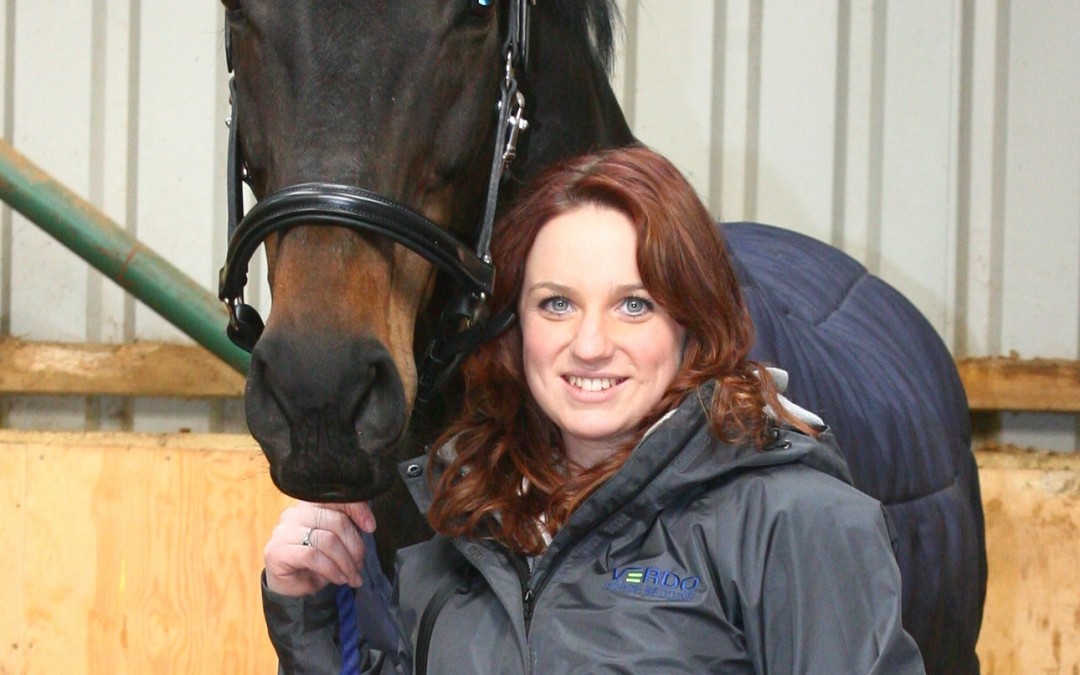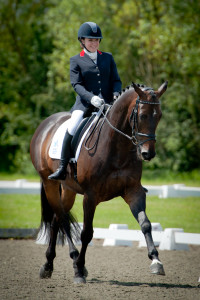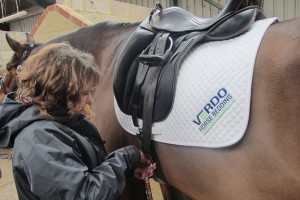At London 2012 Natasha Baker became Para-Dressage Double Olympic Gold Medallist. We ask her how she achieved such an amazing feat.
 Natasha is 25 years old, Grade II Paralympic Dressage Rider. Based in West London, she lives on the family farm. Horses are in her blood and at just 6 months she first sat on a horse. At 14 months old Natasha contracted a rare virus called Transverse Myelitis that left her with a permanent disability. Having a disability from such a young age Natasha feels that she didn’t know any other way, and was brought up to believe that she can do anything she wants, perhaps not in the conventional way, but anything is possible! This positive ‘can do’ attitude has spurred her on to become double Olympic champion in Para-Dressage.
Natasha is 25 years old, Grade II Paralympic Dressage Rider. Based in West London, she lives on the family farm. Horses are in her blood and at just 6 months she first sat on a horse. At 14 months old Natasha contracted a rare virus called Transverse Myelitis that left her with a permanent disability. Having a disability from such a young age Natasha feels that she didn’t know any other way, and was brought up to believe that she can do anything she wants, perhaps not in the conventional way, but anything is possible! This positive ‘can do’ attitude has spurred her on to become double Olympic champion in Para-Dressage.
- 1. How did you progress from riding as a pastime to riding as a career?
I started riding when I was young and felt a real freedom when I was on a horse. I joined the Riding for the Disabled Association (RDA) when I was 9 years old for therapeutic reasons, and from the age of 10 I knew that my future would involve horses in some way. When I was 14 I got my first horse, Charlie, and in time my potential was spotted. I was given extra support and training as part of the World Class team which allowed me to progress to be an Olympian.
- 2. Who motivates you? Who are your role models?
I watched the Olympics at Sydney and was so inspired by all the athletes, both able bodied and Para-Olympians, especially Lee Pearson who did so well despite his disabilities. Any athlete who competes at the Olympics or Paralympics are an inspiration. It is so hard to get to this level, let alone to win, so to be at the Olympics is a real achievement in itself.
- 3. How important is your team? And what support have you received to help you succeed?
My team are so important to my success. My parents have been wonderful all my life, always with the attitude of ‘everything happens for a reason’ and it is important to make the best out of each situation. My mum grooms at events for me, and I have the support from being on the World Class Team, with psychologists, nutritionists, vets, osteopaths etc. There are two athletes, me and the horse, so the relationship we build with the support team over time is so critical to my success.
- 4. How do you stay motivated to train when tired or injured?
It is really hard, but so important to try to stay positive and focused. In January last year I was off for 2 months, and it was so hard seeing the horses but not being able to ride. It is important to have a plan but you need to be flexible as well; things don’t always go according to the script with horses. I ensured that I did what training I could to stay fit, but to also keep me mentally fit. I would visualise myself riding the tests, so I would be ready for when I was competing. I watched videos of me riding, which was hard as I wanted to be on my horse, but it helped me analyse what worked and what didn’t. This meant that when I was physically fit I was also mentally ready to go.
- 5. What qualities do you look for in your horses?
Their temperament is key, they have to be able to cope with any atmosphere as this can vary from event to event. They have to have great paces and be trainable, to have patience and be willing to try. I like a horse who wants to help me out, who I can build a strong partnership with. In any equestrian discipline there are two athletes, the horse and the rider, and it is really about teamwork, building trust in each other. Each of my horses have different personalities, and I try to build on their strengths.
- 6. When a competition doesn’t go as planned how do you stay positive?
I always see each movement of a dressage test separately, so I break it up. I ride each movement individually, and don’t panic if one goes wrong. Breathing through the tests is so important, and I find that I can stay calm and enjoy the experience.
- 7. During a competition how do you keep your nerves under check?
I get excited at competition, and use my nerves positively. I just try to do my best and that is the most important thing. I don’t expect too much, but know that I can do well, so just try to fulfil my potential.
- 8. Did you always see yourself as an Olympic rider? What else do you think you would have been if things hadn’t worked out?
I always knew that I would work with horses, and have followed my dream. I started University but realised it wasn’t what I was passionate about, and that I could always go back to it if I wanted to. If things hadn’t worked out, I think I would probably have worked in equestrian PR or marketing.
- 9. What surprises have there been along the way?
My motto is that ‘everything happens for a reason’, and there have been many surprises along the way, good and bad. Horses have gone wrong in the past, with lameness or not reaching their potential, but I have dealt with the downsides and learnt from them. They have made me a stronger and better competitor. But I have had nice surprises as well – JP my Olympic horse, was not originally for sale, but after trying him a few times, I not only gained a fantastic horse, but a wonderful owner as well.
- 10. Talk to us about the whole Olympic experience? Did it make a difference being in front of a home crowd?
Words can not describe how amazing it was – it was the best experience in my life! Truly incredible! It was a big dream to be surrounded by family and friends and the home crowd, and with a build up of 12 years to get here, the emotions I experienced were too many to be able to name! I was totally overwhelmed by the whole experience. Just to be there meant so much to me, but to then win two Gold medals in front of a home crowd is indescribable!
- 11. What tips would you give someone putting together a freestyle test? How do you choose what to do, what music etc.?
This is your time to show off your best moves and is your chance to show your artistic flare. There are compulsory moves which need including, but you play to your strengths. I was lucky enough to have brilliant music, arranged by the late Ken Barnsley, which really reflected me and my spirit, and matched JP brilliantly.
- 12. What has been the best things to have come out of becoming a Double Paralympic Gold Medallist and getting an MBE?
So much has been wonderful! Meeting the Queen and getting an MBE is just brilliant! I get invites to some great parties and have opportunities open up in presenting and TV which I never thought would be possible. I have enjoyed going back to the RDA and to my old school to inspire others and give something back to those who have supported me.
- 13. What are your 3 top tips to help someone who has riding/sporting aspirations?
- Follow your dream, be determined and focused.
- Life is a rollercoaster. Don’t let the downs put you off, but learn from them.
- Keep smiling! Smile and be happy! It will lift your spirits and those around you.
- 14. What tips do you have on staying positive and motivated to reach your goals?
- Surround yourself with positive people.
- There is no such word as ‘can’t’, even if you don’t do things in the conventional way.
- Find out what your strengths are, and use them.
- 15. If you were in the Paralympic Winter Olympics what would you see yourself doing?
I am totally hooked on skiing! I just love it! If I had started it earlier, then maybe my future could have been different!




Recent Comments